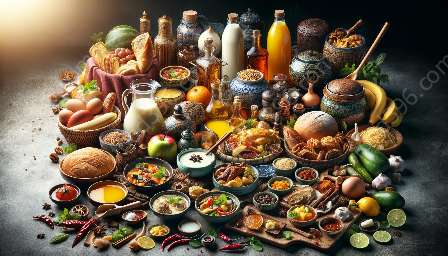Mediterranean cuisine is renowned for its vibrant flavors, fresh ingredients, and rich history that reflects the diverse cultures and regions surrounding the Mediterranean Sea. From the sun-drenched coastlines of Greece to the aromatic bazaars of Morocco, the region's food culture offers a captivating journey through time and tradition.
The Distinctive Elements of Mediterranean Cuisine
At the heart of Mediterranean cuisine are the rich culinary traditions that have developed over centuries, influenced by the bountiful harvests of the land and the bounty of the sea. The use of olive oil, fresh herbs, and an abundance of fruits and vegetables characterizes the region's cooking style, creating an emphasis on healthy and wholesome eating.
The diverse landscapes and climates of the Mediterranean region have given rise to a wide array of distinctive ingredients and flavors. From the tangy citrus fruits of the Southern Mediterranean to the robust herbs and spices of the Eastern Mediterranean, each sub-region has its own unique culinary identity that contributes to the rich tapestry of Mediterranean cuisine.
Regional Variations in Food Culture
Spanning multiple countries and cultures, the Mediterranean region encompasses a myriad of diverse food traditions and local specialties. Each country and even each region within a country boasts its own unique culinary heritage, shaped by the land, history, and people who have called the Mediterranean home.
In Greece, for example, the cuisine is characterized by fresh seafood, olive oil, and an abundance of herbs and vegetables. Traditional dishes such as moussaka and souvlaki reflect the country's rich history and agricultural abundance. In contrast, the flavors of North African cuisine, found in countries like Morocco and Tunisia, are infused with exotic spices, couscous, and slow-cooked tagines, representing the region's fusion of African, Arab, and Berber influences.
The Italian peninsula, renowned for its pasta, pizza, and gelato, showcases the diversity of flavors and ingredients within its various regions. From the rich and hearty dishes of Tuscany to the seafood-centric offerings of the Amalfi Coast, Italian cuisine demonstrates the impact of geography and culture on food traditions.
Food Culture and History
The culinary heritage of the Mediterranean is steeped in a rich tapestry of history, influenced by the conquests, trade routes, and migrations that have shaped the region over millennia. Ancient civilizations such as the Greeks, Romans, Phoenicians, and Ottomans have all left their indelible mark on the food culture of the Mediterranean, contributing to the diversity and complexity of its cuisine.
Moreover, the Mediterranean diet, with its emphasis on whole grains, olive oil, and fresh produce, has garnered international acclaim for its health benefits. Recognized by UNESCO as an Intangible Cultural Heritage of Humanity, the Mediterranean diet not only reflects the flavors and traditions of the region but also embodies a way of life that celebrates the social and communal aspects of sharing meals with family and friends.
The influence of the Mediterranean extends well beyond its shores, with its culinary traditions and ingredients making an indelible mark on global cuisine. Olive oil, for instance, is a staple in kitchens around the world, while dishes like hummus, falafel, and paella have become beloved favorites on international menus, showcasing the enduring appeal of Mediterranean flavors.

